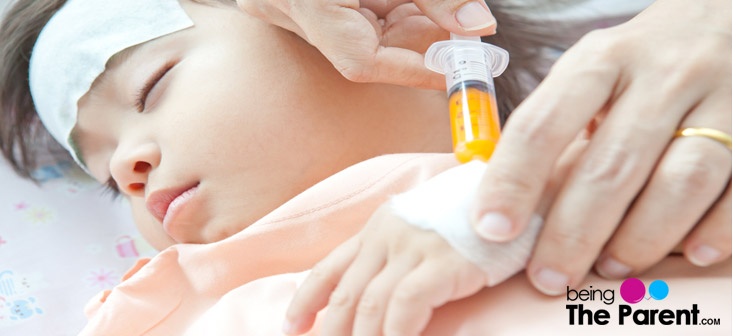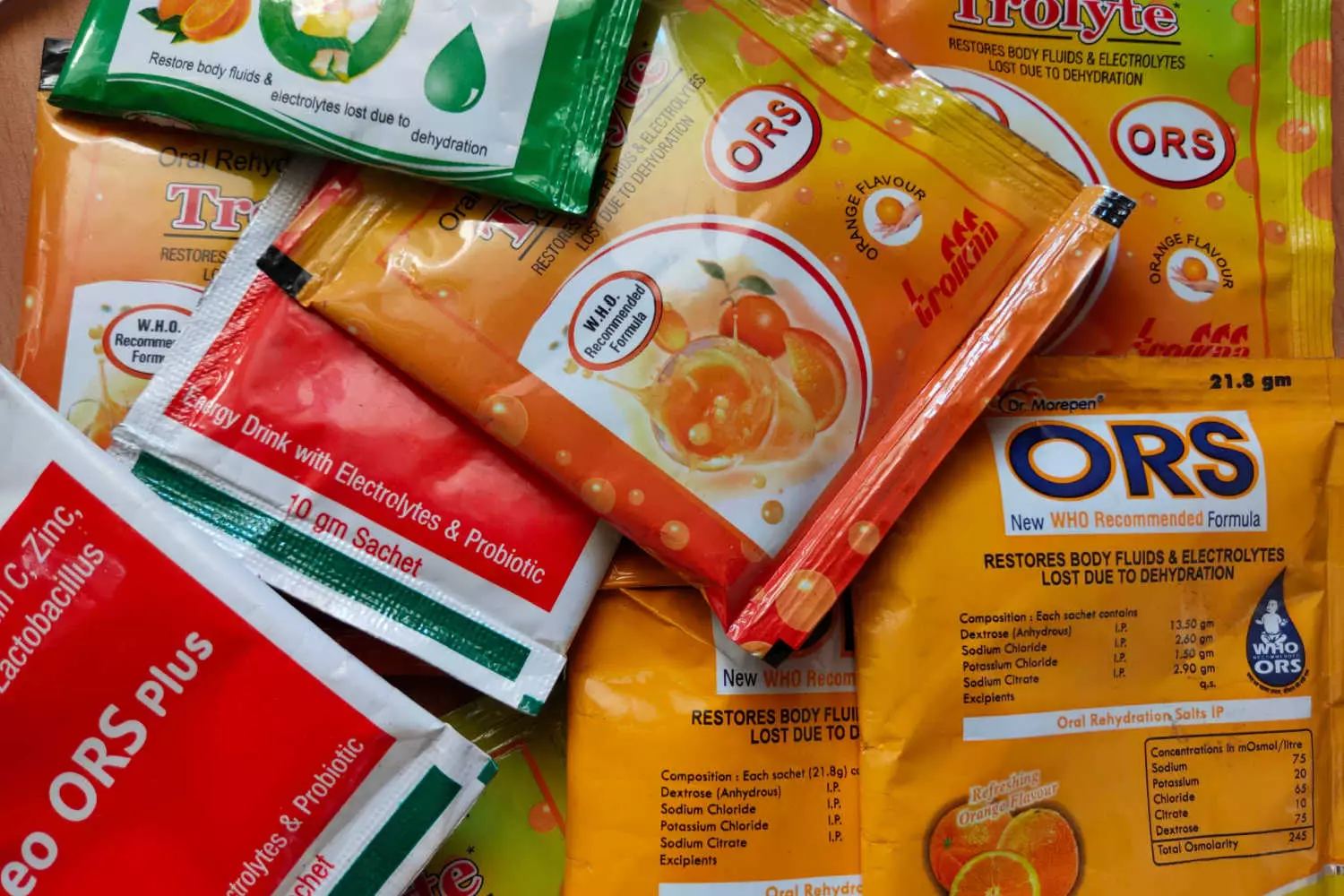
Blood Infection In Children – Causes, Symptoms, & Treatments by Dr. Stalin Ramprakash
8 min readWritten by Editorial Team


Blood infection or blood poisoning is a condition that can affect any person, at any time. Yet, children, especially newborns, are more susceptible to this disease. This is because of the simple reason that their immunity levels are very low. Children who are not vaccinated are more vulnerable to blood infections and also children between 2 months and 36 months of age (when the immune system has not yet fully developed).
Babies under 2 months are shielded from such infection as they receive antibodies from their mother in the womb. The only exception is the group B strep newborn contract from their mother during birth. Generally in normal healthy children the risk of the blood infection in the child will start to decrease eventually, as the child turns two and by the time the child turns 3 years old they will be at a lower risk.
So now you will want to know what blood infection in children is? What are the consequences of the blood infection in children? How would you know whether your kid has contracted blood infection? How would you know when to seek medical attention? Continue reading to know how you can identify the symptoms of sepsis, reasons, and its treatment.
In This Article
- What Is Blood Infection Or Sepsis?
- How Could My Child Get Sepsis?
- What Causes A Blood Infection In Children?
- What Are The Symptoms Of The Blood Infection In Children?
- How Is Blood Infection In Children Diagnosed?
- Complications and Risks of Blood Infections In Children
- How to Treat Blood Infection in Children at Home
- Treating Blood infection In Children
- When To Call The Doctor?
- FAQ’s
What Is Blood Infection Or Sepsis?
Blood infection, which is also known as septicemia ( blood sepsis) is a condition that happens when there is severe infection which could not be controlled and the immune system overreacts to the infection. Uncontrolled infection and the overactive immune system both result in damage to organs and tissues in the body.
How Could My Child Get Sepsis?
Sepsis happens when bacteria that cause infection in another part of the body somehow manage to get into the bloodstream of the baby. The presence of bacteria in the blood and the reaction of the immune system results in a condition called septicemia. Septicemia if not detected on time and promptly treated, can lead to sepsis. Since blood poisoning happens when bacteria enter the blood in conjunction with another infection, the baby may have had a localised infection before developing sepsis.
The infection can occur in any part of the baby’s body, like the lungs, bones, joints, abdomen, urinary tract, or even the skin. If undetected, blood infection in children can harm the organs like kidneys, liver, bones or even the lungs. It can be fatal if not diagnosed and treated on time.
What Causes A Blood Infection In Children?
Even though the major cause of blood infection in babies is bacteria, rarely virus and fungi can also bring about blood infection once they enter the blood stream. The child can contract a blood infection by:
-
- Unvaccinated toddlers and babies are more vulnerable to certain types of blood infection than the vaccinated babies
- Open wound or cut that if left untreated for long while can result in spreading of staphylococcus bacteria in the blood stream of the baby
- Preemies in NICU rely on the catheter, tubes and IV lines and are more prone to blood infection as the incision made to administer this equipment can pave way for the bacteria to enter the bloodstream of the baby
- Pregnancy complication can also result in blood infection in newborn. The bacteria from the mother’s body could enter the blood stream of the baby during delivery if:
- If the mother develops an infection in the uterus or placenta
- If the amniotic sac ruptured too early before delivery
- If the mother develops fever or infections during labor
- Children born and brought up in a poor hygienic atmosphere with poor nutrition and weaker immune system are more vulnerable to blood infections
- Undetected and not properly treated urinary tract infection, pneumonia, ear infections and sometimes, meningitis can cause blood infection in babies
- Any child whose immune system is compromised either birth or treatment for another medical condition ( eg. cancer) are more prone develop blood infections.
What Are The Symptoms Of The Blood Infection In Children?
Most babies and children having blood infection do not show any significant symptoms of this disease other than fever at the earlier stage, making it difficult to diagnose the disease. However, a sudden rise in body temperature or fever that is higher than 100.4 degrees F can be a symptom of the blood infection.
In addition to fever, babies below 3 months show the following symptoms:
- Drowsiness
- Difficulty in breathing. Sometimes, in extreme cases, baby even stops breathing for around 10 seconds
- Your baby may develop jaundice. (jaundice can be a symptom of several other health issues too)
- loss of appetite in babies
- baby refusing to eat/ feed
- Less wet diapers
- Rashes on the skin
- Paleness of skin
- Bulging of soft spot (fontanelles) on baby’s head
- Seizures
Older children show following signs:
- Change in heart rate
- Experience difficulty in passing urine
- Irritability
- Difficulty in breathing
- Vomiting
- Confusion
- Paleness of skin
How Is Blood Infection In Children Diagnosed?
Since there are no specific symptoms of sepsis, and most of the symptoms are that of any common infection, your doctor may order a series of lab tests to confirm or to rule out blood infection in children. The doctor first looks for any sign of ear, throat, or lung infection once your baby develops a fever. If there are no signs they will consider the possibility of a blood infection. The speed of progression of the symptoms will be assessed by your doctor which may give a clue of severe underlying infection. If blood poisoning is suspected, your doctor will run:
- Blood tests to check for the presence of infection-causing bacteria or other microorganisms
- Test for checking the blood oxygen level and for blood clots
- Tests to check the possibility of urinary tract infection
- A spinal tap may be recommended to check for infection (bacterial meningitis)
- A chest x-ray may be recommended to check for infection in the lungs. Pneumonia, if not recognized on time, can lead to the blood infection in children
- CT scans, MRI scans, ultrasound and x rays are also used to detect infections in internal organs of the child
Complications and Risks of Blood Infections In Children
Blood poisoning poses many risks to children. The fact is that it is one of the leading causes of death in intensive care units in hospitals.
Blood infections can prove fatal if they are not diagnosed promptly and treated on time. The death rate is five times higher than that of a heart attack or stroke. If the baby’s organs fail to work, s/he will suffer multi-organ failure in the worst case scenario.
Among the risks are:
- Fall in blood pressure
- A weak heart
- The formation of blood clots in the baby’s body. These clots block the flow of blood and oxygen to vital organs and other parts of your body. You are thus more likely to experience organ failure
How to Treat Blood Infection in Children at Home
Having a blood infection or sepsis is a serious medical issue for children. The situation is a medical emergency that cannot be and should not be handled at home. However, many natural remedies are available that we can utilize along with the treatment.
Slippery Elm:
You can prevent bacteria from attacking and entering your child’s body through a cut or a wound by using slippery elm.
Turmeric:
The traditional use of turmeric for various ailments, including blood poisoning, is well known. This natural remedy has been proven to increase the protein content of a child’s body. With more protein, the body can resist various forms of infection including blood infections.
Herbs:
Dandelions, nettles, and birch leaves can be used for herbal infusions. It is an excellent remedy to ease sepsis symptoms. Boil these leaves in water. This infusion will flush out all the toxins from your baby’s body, preventing blood poisoning.
Honey:
Due to its immune modulation ability, it is believed to be effective in combating sepsis-causing bacteria. In addition, it is considered to speed up recovery. In addition to warding off infection, honey can be applied directly to a wound to heal it completely.
Garlic:
As with turmeric, garlic is also a natural immunity booster, which makes it an effective natural remedy for sepsis. Garlic contains a compound called allicin, which helps to prevent blood infections by fighting inflammation. Give your child chopped garlic cloves with honey regularly. It can help prevent blood poisoning.
Increase Intake of Vitamin C:
Besides being an immunity booster, Vitamin C also helps in healing wounds. It is essential for treating blood poisoning. Vitamin C aids the body in repairing damaged cells. This provides protection to the baby against bacteria in the blood and allows the small blood vessels to function better.
Keeping Germs at Bay:
Last but not least, avoid germs at all costs. Hands must be washed regularly, especially after using the toilet. It is also important to avoid touching cuts and sores with dirty or unwashed hands, as this can lead to blood poisoning.
Treating Blood infection In Children
Timely treatment is essential as the infection can quickly spread to tissues or to heart valves. Therefore, while the lab test’s result are awaited, the doctor will prescribe antibiotics to reduce the fever and minimize the effect of infection on other organs. Once the result of lab test comes out positive then:
- The child is admitted to the hospital
- Antibiotics is also given intravenously to fight infection
- IV fluid is given to keep the child hydrated
- Blood plasma is administrated if there are blood clots
- Blood pressure medicine may have administered to keep the heart working properly
- Respirators are used if the child develops breathing issues
If the infection is in the initial stages, children can recover fast with antibiotics. The infection will clear up in a week or so, but it’s very important to make sure the child takes the whole course of antibiotics and return for any follow-up visits.

How To Prevent Blood Infection In Children?
- Blood infection in the children can be prevented to a certain extent by ensuring all the vaccinations of the child are taken on time
- Also, if there is any cut or infections in the skin, clean it properly
- Look for the sign of infections. Detecting the signs of infection as early as possible will reduce the chance of the child to contract blood infections
- Take your child to the doctor immediately if you notice any signs of sepsis. If detected early, sepsis can be easily cured
- Keep your child away from people who have any kind of skin, lung or sinus infection
- Boost your child’s immune system by giving him healthy and nutritious diet
- Maintain proper hygiene by making sure that your child cleans his hands properly with soap and water to prevent bacteria getting into the body
When To Call The Doctor?
If you notice any signs of sepsis, call your doctor and get it checked. It is not necessary that the symptoms may be of sepsis, but it’s better to rule it out with a proper medical check-up. Take your child to the doctor if:
- He suddenly develops fever
- Has persistent cough and coughs blood
- He has trouble breathing
- You notice that his fingernails have turned pale blue
- He has passed out or has a seizure
- He vomits blood
Always remember that blood infection if detected early and treated on time can be totally cured with antibiotics. So it is necessary that if notice any unusual signs, seek medical attention immediately. Follow the above tips and prevent sepsis in children.
FAQ’s
1. How Long Can a Blood Infection Last?
On an average it may take anywhere from 3-10 days to recover from the blood infection. This time may vary also depending upon the severity of the infection, response to treatment and medication, etc.
2. What is The Best Food For Blood Infection in Kids?
Eating foods rich in Vitamin C, like- orange, kiwi, grapefruit, broccoli, strawberry etc. can help to increase the white blood cell count in the body, thus helping in fighting infection.

Editorial Team,
With a rich experience in pregnancy and parenting, our team of experts create insightful, well-curated, and easy-to-read content for our to-be-parents and parents at all stages of parenting.Read more.
Responses (0)
Want curated content sharply tailored for your exact stage of parenting?
Related articles

Green Parenting – 7 Ways To Raise An Eco Baby

When Should You Introduce Baby Swings to Your Baby?

How to deal with unexpected challenges when traveling with a newborn

ORS For Babies – Is it Safe, How Much to Give and Top Benefits

Top 6 Best Counting Books For Babies in First Year

Life With PCOD After Marriage – A Complete Guide
Sponsored content
Discover great local businesses around you for your kids.
Get regular updates, great recommendations and other right stuff at the right time.





